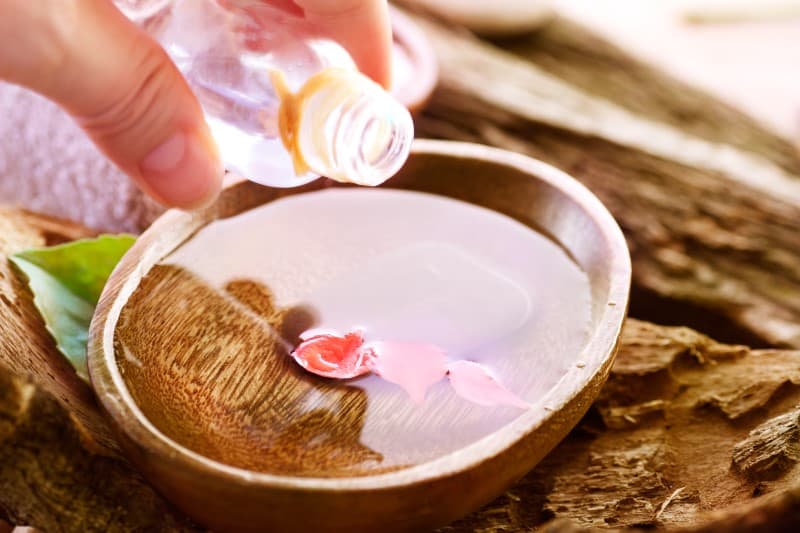Essential oils are gaining momentum as a form of natural medicine. People use essential oils for aromatherapy and in skin products. These natural, highly concentrated plant-based oils have beneficial effects on health and well-being.
Some new essential oil products are being produced, and these are water-soluble essential oils. As a concept, this doesn’t make sense because no oil is water-soluble. So, are water-soluble essential oils real, or is somebody trying to pull the wool over our eyes?
Essential oils are not water-soluble. Oils are purely covalent, and water is polar covalent. Purely covalent substances are only soluble in other purely covalent substances due to how the molecules from one substance interact with and bind to the molecules of the other. Emulsifiers and solubilizers have properties that can cause the oils to dissolve in water.
To properly answer whether or not essential oils are water-soluble, we need to delve into some chemistry. But don’t worry, it will be fun.

Solubility And The Chemistry Behind This Principle
Solute, Solvent, And Solution
- A solute refers to a substance that is being dissolved.
- A solvent refers to a substance in which a solute is being dissolved.
- A solution refers to the mixture produced by dissolving one or more solutes in a solvent.
Definition Of Solubility
Solubility is the largest amount of a solute that can dissolve in a specific amount of a solvent. The solubility of a solute will depend on its own nature and the nature of the solvent.
Ionic, Polar Covalent, And Purely Covalent Molecules
In chemistry, there are three main types of molecules: ionic molecules, polar covalent molecules, and purely covalent molecules.
Ionic molecules are composed of ions. Ions can have either a negative or a positive charge. These molecules are not chemically bound together; instead, the opposite ionic charges physically attract each other and hold them together.
Polar covalent molecules have partial charges on their atoms. These partial charges are created by the unequal sharing of electrons between the atoms. Because the atoms are sharing electrons, they have created a chemical bond called a polar covalent bond. Water is polar covalent with a partial negative charge on the oxygen atom and partially positive charges on the hydrogen atoms.
Purely covalent molecules, also called non-polar molecules, have no partial charges on any of their atoms. The atoms still share the electrons, creating a chemical bond, but the electrons are shared equally. Essential oils are made up of purely covalent molecules.
Polar Covalent Solutes Are Soluble In Polar Covalent Solvents
The partial positive charges of the polar covalent solute are attracted to the polar covalent solvent’s partial negative charges. And the partial negative charges of the polar covalent solute are attracted to the partial positive charges of the polar covalent solvent. This means that the polar covalent solute molecules push their way between the polar covalent solvent molecules, and the solute dissolves.
Ionic solutes are also soluble in polar covalent solvents and vice versa because both ionic and polar covalent molecules have positive and negative charges; these are just partial in polar covalent molecules.
Purely Covalent Solutes Are Soluble In Purely Covalent Solvents
Even though purely covalent molecules do not normally have partial charges, their electron distributions are not static. At random points in time, the electron density in a purely covalent molecule will shift to create a temporary and spontaneous dipole (partial charge) in one part of the molecule.
In the presence of other molecules, this temporary dipole can cause a shift in its neighbor’s electron distribution to produce an oppositely charged dipole in part of the second molecule. This acts like a chain reaction, affecting more and more molecules.
The bond created is a dipole-induced dipole bond, and while it is an extremely weak bond, it allows purely covalent solutes to dissolve in purely covalent solvents. This is what happens when you dilute an essential oil with a carrier oil.
As mentioned, the random formation of a dipole is temporary, and the first molecule will lose its partial charge, but another random or induced dipole will replace it.
Purely Covalent Solutes Are NOT Soluble In Polar Covalent Solvents And Vice Versa
Purely covalent solutes like essential oil are not soluble in polar covalent solvents like water. Why? Because there are no charges on the essential oil molecules to which the water molecules can bind. But what about the temporary dipoles in purely covalent compounds? This is an excellent question, and the answer has to do with the strength of polar covalent bonds compared to the dipole-induced dipole bonds.
In chemistry, the strongest bond will always be the preferred bond because it is the most stable, and molecules like to be stable. The water molecules will not give up their relatively strong polar covalent bonds in favor of weak, transient dipole-induced dipole bonds.
Essential Oils Are Not Water Soluble: Safety Concerns
Now that you know why essential oils are not water-soluble, you can use this information to improve the safety of your essential oil practices. Essential oils are extremely concentrated and harmful to humans if applied directly to the skin unless diluted with a carrier oil.
But what about aromatherapy baths? What about essential oil body sprays? If you will be using essential oils in aromatherapy baths or body sprays, you need to dilute them with carrier oils just as you would do before applying them directly to your skin. The water will not dilute them, so you will come into direct contact with the concentrated oil.
Instead of using a carrier oil to dilute the essential oil, you could force the essential oil to mix with the water using an emulsifier or a solubilizer.
Emulsification And Solubilization
If you were to shake your essential oil with water vigorously, you could create an unstable emulsion, where the oil and the water are mixed but will quickly separate again because no bond has been formed between the purely covalent oil and the polar covalent water molecules.
Emulsifiers stabilize this process of emulsification by acting as a bridge between the oil and the water. Emulsifiers are purely covalent on one end and polar covalent on the other. So, when you add an emulsifier to your essential oil and water mix, the purely covalent end will dissolve in the oil, and the polar covalent end in the water. The oil and water are chemically bonded through the medium of the emulsifier, but the oil is not dissolved in the water.
Solubilizers are also partially polar covalent and partially purely covalent, but their polar covalency is dominant. If you add solubilizer to your essential oil, it will dissolve a small amount of the oil. The oil-containing solubilizer is then added to water, in which it easily dissolves and disperses the oil molecules evenly among the water molecules.
Emulsifiers such as coco-glucoside and liquid castile soap and solubilizers such as acacia gum can be purchased for home use. Alternatively, you can purchase water-soluble essential oils that will already contain emulsifiers or solubilizers.
Why Soap Effectively Removes Oil
Soap is a surfactant. Surfactants are the names given to substances that have polar covalent heads and purely covalent tails. With the purely covalent tails facing inwards, they form spheres called micelles around the droplets of oil. The polar covalent heads, which face outward, then dissolve in the water allowing the oil to be removed.
Conclusion
Essential oils are not water-soluble. Purely covalent substances can only dissolve in purely covalent substances, and polar covalent substances can only dissolve in polar covalent substances. Essential oils are purely covalent, and water is polar covalent.
This insolubility means it is dangerous to use undiluted essential oils in aromatherapy baths and essential oil water-based body sprays because the water is unable to act as a diluter. However, carrier oils are also purely covalent, which is why you can use them to dilute essential oils safely.
Emulsifiers and solubilizers are composed of molecules that have a purely covalent portion and a polar covalent portion. Adding emulsifiers and solubilizers to essential oil and water will allow the two substances to mix. So, the people who are selling water-soluble essential oils are not trying to trick you. Just bear in mind that water-soluble essential oils contain other chemicals and are not pure.
Read more:
